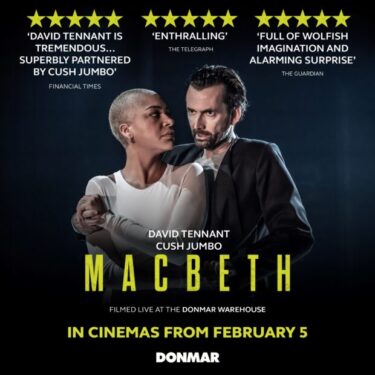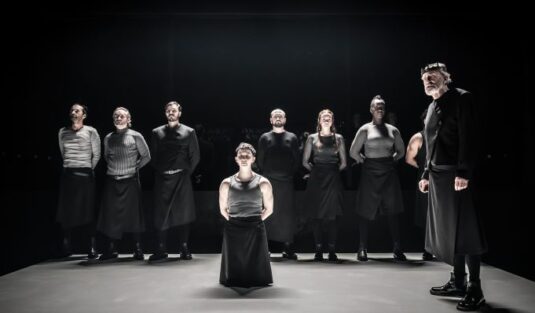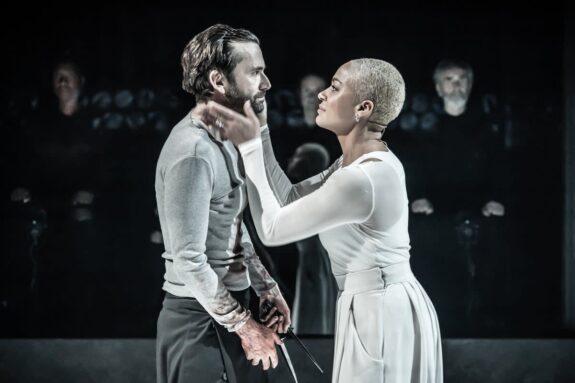 United Kingdom William Shakespeare’s Macbeth: Filmed live (directed by Tim Van Someren) at London’s Donmar Warehouse in 2023 and released in cinemas across the UK, US, Australia and selected international territories from 5th February 2025. (JPr)
United Kingdom William Shakespeare’s Macbeth: Filmed live (directed by Tim Van Someren) at London’s Donmar Warehouse in 2023 and released in cinemas across the UK, US, Australia and selected international territories from 5th February 2025. (JPr)

In 2023 at the Donmar Warehouse with its 251 seats the limited season of this Macbeth production sold-out almost immediately and it earned a recent transfer to the larger Harold Pinter Theatre, as again one of 2024’s hottest tickets, and its run in the West End ended in mid-December. If – like me – you missed both of these opportunities to see it, then coming to a cinema near you from 5 February is a filmed version from the Donmar. It would not give you the complete experience of those who saw it in the theatre because both at the Donmar and the Harold Pinter its USP was that audiences were given headsets for Gareth Fry’s immersive 3D binaural sound design which brought the listener – so I understand – right into the heart of the action.
There was therefore no need for conspiratorial whispers or the frequent interventions of something of a Greek (Scottish?) chorus advancing the plot of director Max Webster’s slightly trimmed version to be shouted out from the stage. Mostly unseen are the wayward sisters (aka witches) and the various murders occurring in the play and hearing them through the headphones may have made for an interesting theatrical experience. There would have also been the immediacy of all the atmospheric sounds of nature – including cawing crows – and Celtic folk music, whether lively or haunting, from a singer and a trio of musicians which included a cèilidh for when King Duncan comes to spend the night at Macbeth’s castle. All this sonic trickery simply provides the soundtrack for what will be seen in the cinema when Tim Van Someren’s camerawork takes you ‘into the heart of the action’ in an entirely different way by more often than not focussing on the emotion expressed on the faces of the two protagonists; with David Tennant’s Macbeth notably more often than not revealing his inner thoughts, increasing turmoil and madness direct into the camera.
Rosanna Vize’s design is that of a slightly raised, white and square performance space which appears to have the audience on three sides. At the back there is a glass (or Perspex?) box for some entrances and confrontations as well as allowing some of the characters to make those noises-off unhinging the minds of the Macbeths. The central platform also acts as a table for Macbeth – now King of Scotland – to sit beside as he conspires to kill Banquo whose descendants have been prophesied to inherit the throne. It also has the attendees for the state banquet sitting around it with Banquo’s ghost (unseen too) created by a whisp of smoke as yet another of Bruno Poet’s extraordinarily effective lighting changes.
In the cinema you will experience Macbeth as a slightly static series of speeches, duologues and conversations with only occasional bursts of activity – from choreographer Shelley Maxwell – including some cèilidh dancing and the climactic fight between Macduff and Macbeth who is left lying in a slowing growing pool of blood. Its vivid red is the first such colour to intrude into the basic monochrome nature of all we have seen so far in the previous 110 minutes. Indeed, nature itself now makes a first appearance as green shoots at the back heralding a better future after the tyrant Macbeth’s death.

The costumes have something of a contemporary look to them and are mostly shades of grey or black for the men, some of whom are in chic kilts. However, Lady Macbeth is in dazzling white and her ruthlessness and immorality is all the more chilling from the get-go because of Cush Jumbo’s quietly understated portrayal which climaxes in a Sleepwalking Scene and ‘Out damn spot’ speech that was – as it needs to be – the most effective and evocative moment of the play and Webster’s direction. That is not to underplay (!) David Tennant’s tour de force as Macbeth, his eyes bore into you from the screen and draw you deep into his character’s dark soul and his rapid descent into immorality.
Unusually for modern times there are Scottish accents for all the cast apart from Lady Macbeth as the English outsider. It is an extremely accomplished ensemble with Tennant and Jumbo supported by standout performances from Cal MacAninch’s touchingly paternal Banquo, Noof Ousellam anguished Macduff (who is bullied into killing Macbeth), Ros Watt’s vengeful Malcolm, and the remarkably talented young Casper Knopf in three heart-rending roles.
Enjoy too the interlude involving Jatinder Singh Randhawa’s Porter who provides light relief after Duncan’s death and breaks the fourth wall by interacting with the theatregoers and asking why they ‘paid 60 quid to see a radio play’, muttering that he had ‘kilt’ the last person who called what he was wearing a ‘skirt’, and encouraging them all to join in an extended ‘Knock! Knock!’ joke.
If you know your Macbeth as the play or are a first timer like I was (I had previously only seen Verdi’s opera version) either way I cannot recommend this flawlessly filmed staging highly enough. For more information for where it is on at a cinema near you soon click here.
Jim Pritchard
Featured Image: David Tennant (Macbeth) and Cush Jumbo (Lady Macbeth) © Marc Brenner
Cast:
David Tennant – Macbeth
Cush Jumbo – Lady Macbeth
Cal MacAninch – Banquo
Noof Ousellam – Macduff
Rona Morison – Lady Macduff
Ros Watt – Malcolm
Benny Young – Duncan / Doctor
Brian James O’Sullivan – Donalbain / Soldier / Murderer / Musician
Moyo Akande – Ross
Jatinder Singh Randhawa – The Porter / Sevtan
Annie Grace – Musician / Gentlewoman
Kathleen MacInnes – The Singer / Ensemble
Alasdair Macrae – Musician / Ensemble
Casper Knopf – Macduff’s Son / Fleance / Young Siward
Creatives:
Director – Max Webster
Designer – Rosanna Vize
Lighting designer – Bruno Poet
Sound designer – Gareth Fry
Movement and Intimacy director – Shelley Maxwell
Voice & Dialect coach – Barbara Houseman
